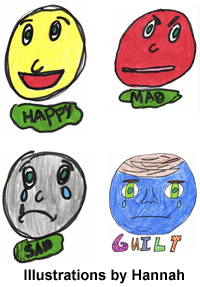
In my post on Understanding Feelings: True and False Guilt, I told of being plagued with guilty feelings, which I discovered had originated in my childhood. I reached that discovery when I took a study course at my church on The Four Temperaments. It was one of the most enlightening moments of my life.
So, today, I am going to write a brief overview of temperaments. When you recognize the temperament and the emotion associated with it in a child, you will then be able to help him find ways to manage his feelings in a healthy way, less it goes out of control and be carried over into his adulthood as mine did.
Temperament Defined
Temperament can best be described as our own UNIQUENESS. Psalms 139:14 says: “I am fearfully and wonderfully made.” This uniqueness sets us apart as an individual. Two people can look at the same situation and see it completely different. Our circumstances, IQ, nationality, economics, environment, and parental influence can mold us, but underneath, we remain the same. Temperament is the real me.
The 4 Types of Temperaments
Most educators of human behavior classify temperaments into 4 categories that describe each person’s personality. Those categories are: Sanquine, Choleric, Melancholy, and Phlegmatic.
Each temperament has a wonderful display of strengths. However, it also has weaknesses. Why weakness; after all, it was God who uniquely designed us. Like everything else, it goes back to The Fall of Man. Adam’s sin was like an infectious disease that spread evil into all the good that God created. The good news is that when we know our weak areas, we can then stamp out the infection to keep it from continuing to spread in our life, and also our children’s lives
The Emotions of Temperament
Each of these temperaments carries with it a particular emotional response to life’s circumstances, as Hannah has beautifully illustrated.
 Sanguine is an outward happy person, but underneath that happiness often resides suppressed anger.
Sanguine is an outward happy person, but underneath that happiness often resides suppressed anger.- Choleric has a predominately outward anger response to circumstances.
- Melancholy has a tendency to be sad during circumstances, which can lead to depression.
- Phlegmatic is often plagued with feelings of guilt.
Just briefly, I’d like to expand on the phlegmatic’s strengths and weaknesses, as well as its emotional response because, that is ME.
My first memory of experiencing or recognizing feelings started when I was six years of age and entering the first grade. Having very protective parents, I was instructed not to play on the swings nor go near them on the playground. Sitting under the trees while everyone else was having fun was tough for a 6-year-old to endure.
One day I could not take it any longer, so I wandered over to the swings. Wouldn’t you know it; one of the high-flying swinger’s foot hit me in the head. The kick in the head did not hurt me nearly as much as the overwhelming “feeling of guilt” that instantly swept over me for disobeying my parent’s instructions.
The guilt feeling increased over the next few days to the point that I thought I should “confess up” to my deed of disobedience. And that’s when I got the first little sermon from my well-meaning mother entitled: “be sure your sins will find you out.” From that day forward, it seemed as though “my sins” found me out with whomever I came into contact. If something went wrong, it must have been my fault, and guilt would crank up and run full speed.
Added to this emotion of guilt, studies show that the weakness of the Phlegmatic temperament can be described as: indecisive, don’t rock the boat, go with the flow, easy-going, laid back, wants peace at all cost, and doesn’t like conflict. Again, that was ME.
And so it was, this pattern that had begun at 6 years of age followed me into my adult life. I had thought it was virtuous to be so easy going and the “peace maker.” But what was actually taking place was I was slowly turning into an intimidated person to avoid consultation, and filled with guilt if everyone wasn’t happy.
As a result, most of the strengths associated with my temperament lay dormant and unused. But, thankfully, through much prayer, study of God’s word, and of course, the study of temperament, God brought me to a new place of freedom. That’s why I am so passionate in getting this message out for hurting children. No child should have to grow up filled with guilt, anger, or depression.
So, my dear friend, with that thought in mind, I strongly urge you to seek knowledge on this subject of temperaments so you are better equipped to help hurting children.
Join Hannah and me next week, as we continue our study on Understanding Feelings.
Recommended Books on Temperament
- Personality Plus for Parents by Florence Littauer
- The Temperament God Gave Your Kids by Art and Laraine Bennett










Great job mom & hannah as usual!
Hannah knocked the message out for me. Of course, this is one of my favorite subjects.